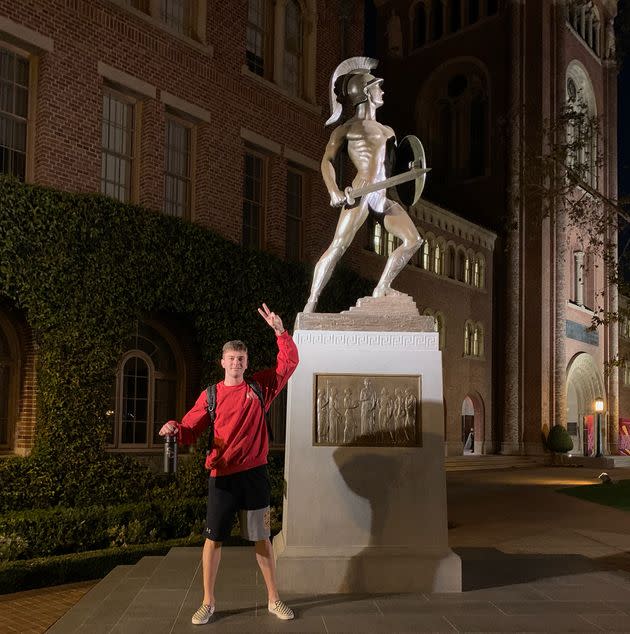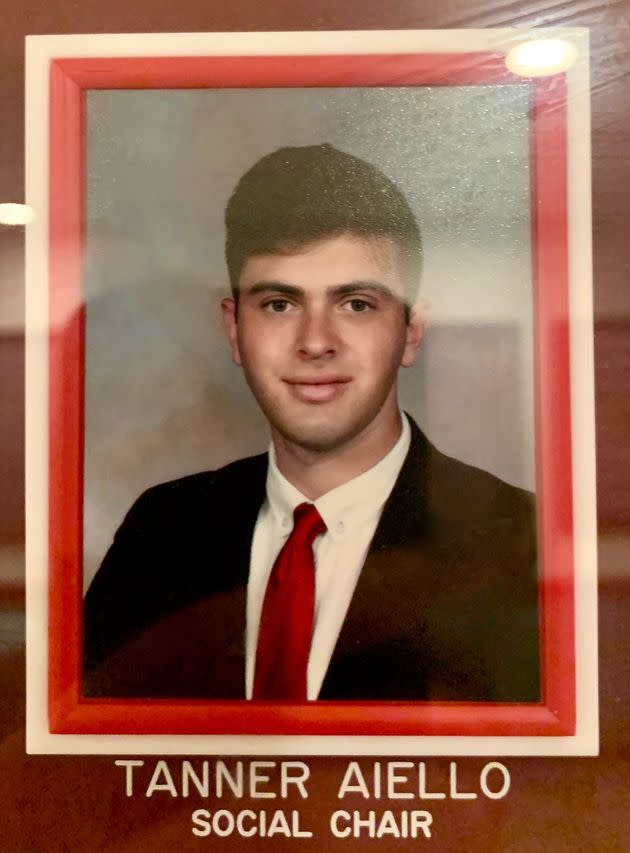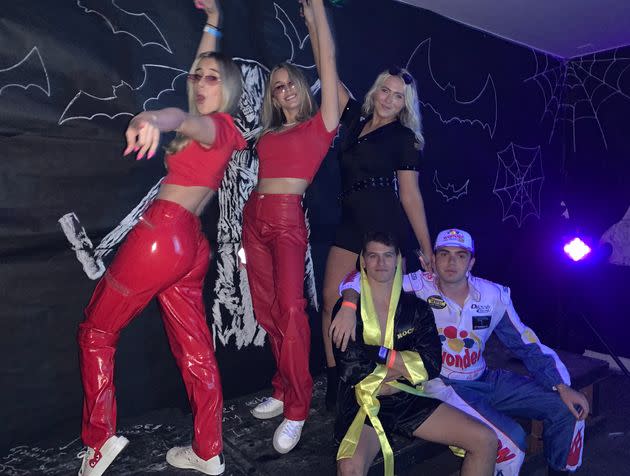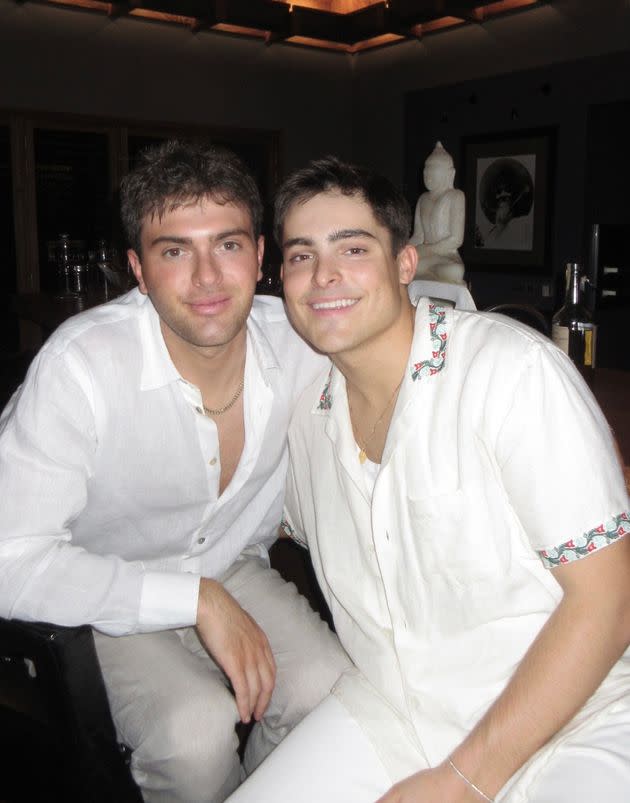During A Night Of Hazing, I Confessed A Dark Secret To My Pledge Brothers. It Changed Everything.

On a cold, stormy September night in 2018, my 14 fraternity pledge brothers and I received this ambiguous text from one of our pledge masters:
“Tonight’s education meeting is canceled. At 11pm, you will all load into three of your cars and drive to the destination I send you. Bring a first aid kit, five jugs of water, three shovels, and a triangular-shaped candle. Dress in all black.”
My mind raced with questions. What could this mean?
An hour later, my palms choked the steering wheel of my Ford pickup truck as I drove from our fraternity house at the University of Southern California toward an unnamed address in Manhattan Beach. In the car with me were four of my pledge brothers.
“It’s got to be beach-related,” said a brother from the back seat, his voice barely audible over the rain pounding on my windshield.
“Maybe it’s a house party,” another suggested.
“It’s definitely not a house party,” the one in the passenger seat countered. “We’re getting hazed tonight, boys!”
A knot of anxiety tightened in my stomach. This moment, shrouded in uncertainty, mirrored the complex feelings I’d been wrestling with since joining the fraternity three weeks earlier. As the fraternity’s first-ever openly gay member, each new challenge not only tested my resilience but also brought into sharp focus my ongoing struggle for acceptance and community.
When I signed up to rush, I was seeking the real college experience, complete with large backyard parties and drunken antics with friends. Growing up, I idolized shows like “Blue Mountain State” and movies like “Animal House,” which inspired my fantasies about Greek life.
My desire to join a fraternity was also driven by a longing I had always felt to be included in the “boys’ club.” During adolescence, I was never part of an all-male friend group. I didn’t play sports and couldn’t feign toughness.
In hindsight, maybe an on-campus LGBTQ club would have been a more fitting place to find belonging. However, I had attended a conformist Christian high school where gay people were often looked down upon, so I was unfamiliar with these types of organizations or what they might have been able to offer me.
During the first week of college, my mom, understandably protective, tried to dissuade me from rushing. She feared that as a young gay man who had come out just a month earlier, I would be rejected or maybe even harmed.
Although fraternities are notorious for homophobia, I met a brother during rush week who alleviated the doubts my mom had placed in my head.
“You told me you were looking for a community — a place to belong,” he said. “Here, there are always brothers to hang out with and friends to lean on. It’s not about being gay or straight; it’s about who you are. You’re one of the coolest guys I’ve met, Tanner. You won’t be ‘the gay brother.’ You’ll be Tanner, our brother, who also happens to be gay.”

Three weeks in, my pledge brothers were already becoming some of my closest friends. We cleaned rooms in the house together, ate all of our meals together, and studied for hours together. I played wingman at sorority mixers and got praised for effortlessly starting conversations between my brothers and pretty girls. I was living the college experience I’d always dreamed of, filled with fun parties and new friends.
The upperclassmen welcomed me as their first openly gay member, too. Candid discussions about my sexuality emerged during late-night, alcohol-fueled conversations. Brothers would ask, “What was coming out like?” and “How can we better support you?” My closet door was wide open. I wanted to prove to myself and to others that I could handle the challenges and be an equal, regardless of my sexuality.
Turning off the main road, we entered a damp, empty single-story parking structure. The Leader, the nickname for our main pledge master, was waiting for us at the entrance gate.
“Leave your phones in the car,” commanded the intimidating young man with a permanent frown, tightened jaw, and ghostly pale skin.
After I stepped out of my truck, The Leader pointed down a road. “Follow it to the beach,” he told us. “Then, turn right at the boardwalk and continue until you find the rest of your pledge class.”
My heart raced as I imagined what might be about to happen.
We stepped into the rain and walked down a steep residential side street faintly lit by street lamps. Shivering, we reached the boardwalk and turned right, walking about two miles, until we hit a stretch of beach obscured by towering power plants that blocked any view from the street. Here, I thought, no one would hear me screaming.
Just when I started to wonder if this was all a prank, through the dense fog and rain, I saw the silhouettes of my other pledge brothers lined up beside a lifeguard tower. The other four pledge masters — dressed in all-black and looking as ominous as ever — stood 10 feet across from them.
“Fall in line, boys,” boomed one of the pledge masters. Escape no longer seemed an option.
Once The Leader caught up to us, he outlined the purpose of the hazing exercise. He announced that “Beach Night” would test our strength, worthiness and desire to join the fraternity.
“Don’t think of this as a group of 15, think of it as one unit. You’re only as strong as your weakest link,” he said, emphasizing the need for unity in this test.
He concluded by setting our task for the night: build a huge triangular pit, 10 feet long on each side and four feet deep. I didn’t understand why building a triangle pit was necessary, but most of the pledge process didn’t make much sense to me.
After 10 minutes of digging, sand was stuck under my nails and all over my face and eyes. Soon, the pledge masters began punishing us for no other reason than to make us suffer.

Our first punishment was a sprint to the nearest lifeguard tower and back. My scrawny body struggled to keep up with the others, which was even more difficult thanks to the three previous weeks I’d spent staying up late and drinking heavily. Fortunately my pledge brothers rallied around me and another struggling brother.
“Pledge class of what?” a brother shouted.
“PLEDGE CLASS OF ONE!” we responded in unison.
The tasks grew more demanding.
“Dig faster! Harder!” the pledge masters yelled. Our three shovels were soon taken away because, according to them, our progress had slowed.
We received more punishments.
“Swim out at the whistle,” The Leader commanded.
“PLEDGE CLASS OF ONE!” we chanted together in response, and charged toward the ocean.
When we had almost finished digging the triangular pit, the Leader stopped us from working and lined us up, creating a palpable sense of anticipation among the pledges. Then he presented a daunting challenge: The last person to reach the ocean some 50 yards away would be cut from the pledge class.
“On my mark... Go!” he yelled.
We all paused. A brief moment of uncertainty hung in the air — and then, as if ignited by an invisible force, we sprang into motion. One pledge brother led the charge, racing ahead with unmatched determination, but soon, “PLEDGE CLASS OF ONE!” erupted from another brother. His cry pierced the darkness and rallied the rest of us together.
“It’s a trick!” another yelled.
We stopped competing with one another and joined together 20 feet away from the water’s edge. As the sun began to rise amidst the ongoing storm, a profound sense of connection overwhelmed me. It was a feeling of being part of something greater — a fraternal, barbaric elation I’d never felt before.
We advanced towards the ocean with our arms interlocked. Our voices united in a chant that declared our solidarity: “PLEDGE CLASS OF ONE!”
As our toes made contact with the water, an eerie silence enveloped us. Time seemed to be holding its breath.
Suddenly, The Leader’s voice broke the stillness.
“Come back!” he called out, with a hint of compassion. “Come on, guys, come back!” he repeated, in a soft tone that bordered on pleading.
When we returned to the triangular pit, we found our five pledge masters seated within it, struggling to light a big, red triangular candle. The wind thwarted their efforts, and watching their futile attempts made them appear almost pathetic, a term I never thought I’d use for them.
I looked up from the pit to the rising sun and realized I had class in just a few hours. But our night wasn’t over.

The Leader carefully explained the next phase of the exercise. First he congratulated us on passing “Beach Night,” which he called a “test.” Then he spoke about our newly formed lifelong bond and the chance to open up to our new family. He told us the pit we’d dug would act as a sacred space to reveal our secrets.
“This is a safe space — an open space for you all to share things about yourselves so that you can become closer as brothers,” he said.
I was so cold my jaw rattled, but I didn’t care. I was captivated by what was taking place around me.
One by one my brothers began to open up about shattered athletic careers, battles with drug addiction, eating disorders and anxiety. They spoke of the loss of family members and friends. As each person revealed his struggles, fears and mistakes, it felt as if a weight was being lifted from me. We were exposing our true, unfiltered selves. It was a chance to embrace our imperfections and let go of judgment.
When it was my turn to share, it felt right to reveal an intense trauma that I had kept hidden for years. I told my brothers about the sexual abuse I had endured at the hands of a trusted family friend.
“I thought he had all the answers. I didn’t want to do those things with him, but I felt I had to,” I said. I spoke about how I’d confided in him when I was 13 about my feelings for men, and how, not long after, he started making advances on me.
Trying to formulate the words to express what I had been through for the first time, I told them, “My family loved him. He was always around. His words were all I knew. He made me seek validation from him, and he used it to take advantage of me.”
My sentences toppled over each other, spit flying from my quivering lips.
“It seemed like he wanted me to stay closeted forever — like my sexuality was our little secret,” I said.
It was the first time I had ever shared these traumatic memories with anyone. This admission to my pledge brothers ended up sending me on a three-year healing journey. Soon after “Beach Night,” I finally began therapy, something I had never pursued before because I was too ashamed to speak about what my abuser had done to me.
My pledge brothers moved closer to me in the triangle pit to hug me and hold my hand.
“This brotherhood makes me realize what life’s all about — having a group of friends who love me. That’s all I can ask for,” I told them.
This was what I had always hoped for: a community where I could be supported and be myself. As I sat in that pit at 6 a.m. experiencing my brothers’ genuine care and acceptance, I knew I had finally found it.
I hope telling my story might also open the minds of people who think it’s impossible for a gay guy to thrive in a fraternity.
I know not every gay pledge is as lucky as I was. Despite how far our society has come, homophobia still runs rampant — not just in Greek life, but also in our country and around the world. While I was simply looking for a place to belong and a brotherhood to share my life with, I’m confident that my participation in this fraternity changed and opened some minds. What’s more, I hope telling my story might also open the minds of people who think it’s impossible for a gay guy to thrive in a fraternity.
From my experience, it’s not only possible, but also beneficial for every brother involved. It’s a testament to the progress we’ve made as a society, and a reminder of the work still to be done to ensure that everyone, regardless of their sexual orientation, can find a place where they feel accepted, respected and valued.
“Beach Night” was truly a turning point in my life, and from then on, everything was different. I never thought I would find solidarity in a group of frat boys, but I did, and I could not be more grateful for what they’ve helped me achieve.
Note: Some names and identifying details have been changed to protect the privacy of individuals mentioned in this essay.
Tanner Aiello’s writing explores his experience as the first openly gay member of his college fraternity. He’s currently finishing up his debut novel, “Tales of a Gay Frat Star.” Follow his book journey on Instagram, TikTok or Twitter @gayfratstar.
Need help? Visit RAINN’s National Sexual Assault Online Hotline or the National Sexual Violence Resource Center’s website.
Do you have a compelling personal story you’d like to see published on HuffPost? Find out what we’re looking for here and send us a pitch at pitch@huffpost.com.

